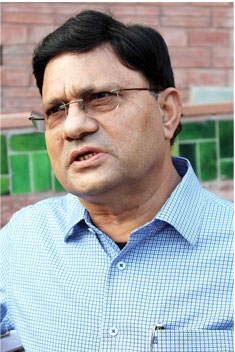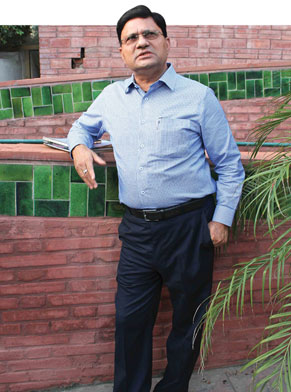IT was like yesterday. Brijesh Kumar Gupta had just entered Niranjan Talkies in Allahabad to watch a movie when he heard shouts of “Kaptan sahib aa rahen hain (The SSP is coming)”. Gupta, then in his early 20s, a student of MA (History) in Allahabad University, got pushed around in the melee. He, obviously, did not like being shoved around.
But after the 1971 incident, an idea—‘Why shouldn’t I become a Kaptan?’—took root in Gupta’s mind. The posting of BS Bedi and Ajayraj Sharma, 1961- and 1966-batch Uttar Pradesh cadre Indian Police Service (IPS) officers, respectively, as Senior Superintendent of Police (SSP) in Allahabad further steeled his resolve to be part of the steel frame.
He remembers how the university students feared Bedi—to such an extent that they would not even gather in groups after sunset. Bedi did not like students keeping long hair and would forcibly give them a haircut. “It was quite a spectacle. We would hear ‘Bedi aaya’ everywhere. He stopped crime in the city,” he recounts.
Similarly, the posting to Allahabad of no-nonsense encounter specialist Ajayraj Sharma, who served as Delhi Police Commissioner from 1999 to 2002, made Gupta a big mureed (admirer) of the IPS.
Gupta, son of a well-to-do businessman Jagdish Prasad, appeared for the civil services in 1974 and became the first civil servant in his family. In 1975, he was allotted the Arunachal Pradesh-Goa-Mizoram and Union Territory (AGMUT) cadre. His father, a wholesale dealer of commodities, was happy his son had become an IPS officer (“kaptan ho gaya”).
But for him, the biggest advantage of being a police officer was that he could buy cinema tickets with ease. A Bollywood buff, Gupta claims to have seen Sholay and Mera Naam Joker 17 and 15 times, respectively.
Sanjeev Kumar, the actor who played a tough inspector in Sholay, was a role model for him. Gupta loved Kumar’s heroics, including the horse chase scene filmed with Gabbar (Amjad Khan) in the movie.
Gupta found it surreal when policemen patrolled on horses during Dussehra celebrations and the Kumbh fair in Allahabad. He says he has an abiding interest in horse riding and rode one frequently during his training as Assistant Commissioner of Police (ACP) in Delhi.
During the training, Gupta’s trainer, Omprakash Chaudhary, stressed the use of third degree torture methods to deter criminals. Chaudhary would tell his wards to break the legs of five criminals to send a message to all criminals in their area. Public beatings by the police were common in those days.
But, an incident during Gupta’s posting as Deputy Commissioner of Police (DCP-North) in the late ’90s turned his belief in third degree methods on its head. “Three boys walked into my room. They had their legs fractured,” he reminisces. The boys were beaten up by policemen because they were riding a motorbike together, while the rules permitted only one pillion rider with the driver.
Along with the influence of then Police Commissioner Vijay Karan’s public-friendly approach—Karan introduced the ‘with you, for you always’ slogan of Delhi Police—and his seven years in the North-East, where he found the people most modern, the incident turned him completely against the use of third-degree measures.
So much so that in November 2010, when he took over as Delhi Police Commissioner, one of his first decisions was to disband the Social Defence Unit, which according to him, had become a den of corruption and indulged in harassing young couples in parks and other public spaces. “Police would not catch traffickers and instead harass (call) girls who, I realised, were victims,” he recalls.
Gupta, who lived in Chankayapuri for 29 out of 37 years of his service and would go for morning walks in Nehru Park, made it clear to his staff that he was ‘dead against’ moral policing and would not allow policemen to harass young couples in parks. “The police’s job is to catch criminals. I told them (Delhi cops) not to touch the young couples,” he remembers.
APART from emphasising the ‘humane’ approach of the police, Gupta says that his other satisfying achievement was when he got Ishaan, an 18-month-old child, rescued within days of his abduction. “Ishaan’s mother was in my house when her son was released. You should have seen her face,” he remembers with a smile.

Before joining as Delhi Police Commissioner, Gupta served as Director General (Prisons) in Delhi’s Tihar Jail for over four years. During his tenure, Tihar got 15 ISO certificates, including the ones for the introduction of a visitor management system, segregation of first-time offenders from repeat offenders, a drug addiction centre and quality management system in the jail factory. He claims that he was the first DG, Tihar, who became Police Commissioner of Delhi, breaking an old jinx.
“Jails were renovated, ROs installed, a phone system for inmates was introduced and Amul outlets were opened. Tihar became a role model for prisons in the country,” he adds.
Gupta is opposed to capital punishment. Interestingly, during his tenure, there was not a single prisoner death in Tihar. “There is no point in killing a criminal. Let him spend his life in the prison and feel the pain of his crime,” he opines.
As told to Narendra Kaushik












































